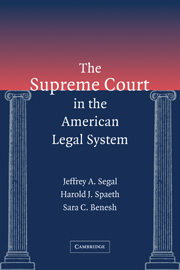4 - Civil Procedure
Published online by Cambridge University Press: 05 June 2012
Summary
Determinative of the outcome of many cases are the procedures – the rules of the judicial game – that govern trial court processes. Rules of procedure also apply at the appellate court level, but these are largely limited to the amount of time losing litigants have to file their written appeals and the form and structure of their supporting brief. Unlike the verbal focus of most of the trial court process, that of the appellate courts is written. Though time for oral argument is commonly available at the first appeal – which is typically the only one that the losing litigant has a right to have – these arguments largely rehash material in the written brief and are supplemented by questions put to the litigants' attorneys by members of the panel of appellate court judges.
In this chapter we emphasize those aspects of noncriminal court procedures that touch on constitutional law, which, of course, is the special province of the Supreme Court. But because of the interrelationship between the constitutional and nonconstitutional aspects of civil procedure, we also provide a succinct overview of civil procedure's nonconstitutional features so that the reader may readily grasp its scope and importance. But we do not concern ourselves with criminal procedure here, but rather in Chapter 6. Criminal procedure is fundamentally charted by the provisions of Amendments Four, Five, Six, and Eight of the Bill of Rights, not by statutes or court rules.
- Type
- Chapter
- Information
- The Supreme Court in the American Legal System , pp. 75 - 96Publisher: Cambridge University PressPrint publication year: 2005
- 1
- Cited by



